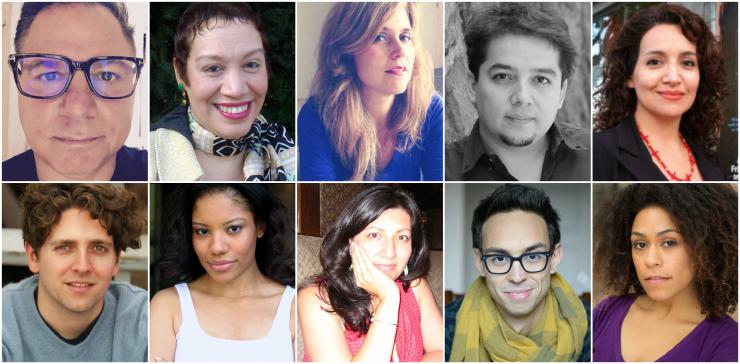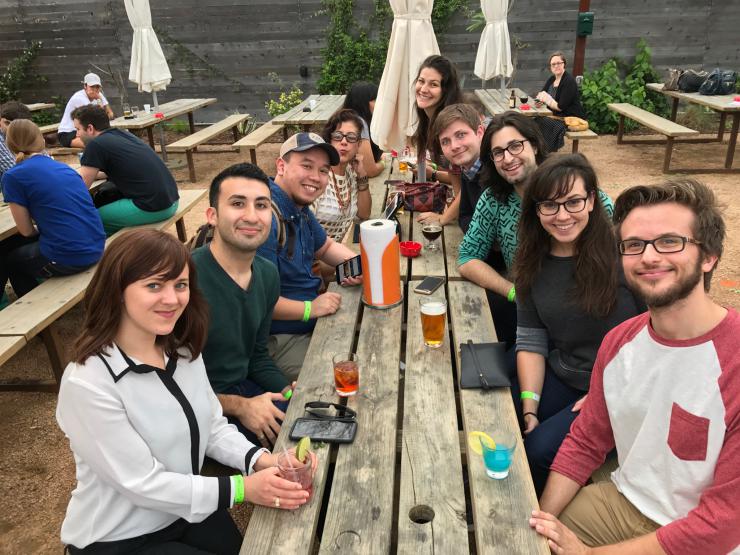Creating a Digital Archive of Latinx Playwriting
After years of toying with the idea, in early 2016 I finally launched the 50 Playwrights Project, a digital humanities project advocating for the work of Latinx playwrights. To give some background, while I was pursuing my PhD, I always wanted this resource. For years Adam Szymkowicz has interviewed playwrights on his blog. As of July 2017, his “I Interview Playwrights” series has featured 965 writers and the website has been visited over 1.7 million times. Szymkowicz has featured many Latinx writers and has done a commendable job of interviewing writers of diverse identities. Yet, I visited Szymkowicz’s site and wanted a space that was strictly devoted to the writers I wanted to see, read, study, and work with.
With my degree finished, I was ready to launch the 50 Playwrights Project. Why fifty? Well, I envisioned only interviewing fifty playwrights and it taking around two years. When that moment came, I would start a new series of fifty or the project would be finished. Honestly, I didn’t think the project would have much of an impact so quickly. I thought my friends, close colleagues, and the playwrights themselves would embrace it. With any luck, professors would use the resource in their classrooms, at least letting their students know that it existed. At best, artistic directors and literary managers would take notice and use the archive to search for new work to produce by Latinx playwrights. Yet, soon after launching the project on social media, I was met with a more than receptive response from the Latinx theatre community. It didn’t take long to notice that people were hungry for these types of resources and that playwrights wanted a platform to promote their work. Perhaps it was the buzz or my impatience, but the project moved at a faster clip than I had originally intended, and before I knew it, I was posting at least one interview per week. All in all, it only took me a little over a year to reach my original goal. (See 50 Playwrights Project for more on the project’s mission and goals.)
As the project moves into its second phase, the name remains the same, harkening back to the original mission of the 50 Playwrights Project. The profile interviews will continue. In addition, the project includes a second interview series, FAQs, that features playwrights answering questions about specific plays. Moreover, in March 2017, we published our inaugural list of the Best Unproduced Latin@ Plays from a national call for plays which were selected by a reading committee.
I imagined 50 Playwrights Project would be an isolated website with little interaction between the playwrights featured. I couldn’t have been more wrong.

While the project continues to surprise me, allowing me to grow as an arts leader and advocate, here are the things I’ve learned so far.
The Project Connects People
Given the 50 Playwrights Project exists almost entirely in a virtual space, I never thought that it would connect people in the ways it has. So much of writing (both academic and creative) happens in isolation. I’m a huge supporter of communal writing groups and spend an abnormally high amount of time writing in the presence of other writers. Even so, I likely spend over 50 percent of my writing time alone. Research would be an even higher number. With these thoughts in mind, I imagined 50 Playwrights Project would be an isolated website with little interaction between the playwrights featured. I couldn’t have been more wrong. Since the very beginning of the project’s launch, I have witnessed the featured writers connecting and building a community of Latinx playwrights in many ways. While there is now a place to (re)introduce writers to an audience, I have also seen conversations emerge on social media and I’ve heard of some writers in the same region connecting, writing together, and even collaborating with one another.
The Project Is Entrenched in Advocacy
I’m a connector. Part of my work as an ally and advocate is to put people in contact with others. Naturally, this has extended into the virtual world. I’ve seen it time and again that people will visit the website and then contact me about getting in touch with one of the playwrights. Usually they want to read one of the plays. While it’s too early to tell, I am often curious about what opportunities will come of this for playwrights. The idea of a writer getting readings, workshops, and commissions based on being featured in the project is fundamental (I’m thinking mostly of the emerging writers). But as a scholar, I think about more than the business side of theatre. I hope a graduate student does a google search for “Latinx playwrights,” finds 50playwrights.org, and writes a seminar paper on one of these playwrights. I hope that seminar paper becomes a dissertation and that dissertation becomes a book.
Theatre Companies Are Hungry for Accessible Resources
I became a de facto literary agent and literary manager. I only envisioned publishing interviews several times a month and slowly amassing a digital archive that scholars, students, practitioners, etc. would find useful. I expected university professors to reach out looking to connect them with playwrights and these efforts have resulted in several new writers being added to the curriculum at various universities across the country. Yet, little did I expect dramaturgs, literary managers, and directors of new play development—some from major institutions—to contact me looking for new work by Latinx playwrights. By and large, whether theatre companies actually do the work or not, they recognize the importance of staging works that are representative of the United States in 2017. For the most part, this means producing works by people of color (and employing POC in all types of jobs at the theatre company). So if everyone recognizes the need to build inclusive theatre, then why are so few companies doing it? While I don’t believe we should be making excuses, I do believe part of the issue is how we are training future theatre practitioners in university programs. Theatre educators by and large reinforce the canon, which, as we all know, is predominately comprised of Anglo men. There is nothing wrong with Tennessee Williams and Martin McDonagh, but we do our students a disservice to not introduce them to contemporary playwrights of color.
Having a Digital Presence is Essential in 2017
I believe another issue facing Latinx theatre is the lack of accessible resources online. For instance, in this day and age, if a playwright doesn’t have a Wikipedia page then, in the public eye, they don’t exist. In 2017, having a Wikipedia page is the bare minimum web presence writers should have (along with a personal website, another necessity). Even a page as simple as a short paragraph of biographical information and a few sentences about their work is sufficient. Yet, so few playwrights of color have this sort of digital presence. While some people are working to update the digital narrative, such as Jules Odendahl-James, Catherine María Rodríguez, and Russell Dembin’s #Wikiturgy Project, and Noe Montez of Tufts University who has his students create Wikipedia pages for Latinx theatre artists (read the Café Onda blog here), we need to collectively, as a field, work to fill these gaps. This is why I think the 50 Playwrights Project has found an audience and has attracted people from outside of the Latinx theatre community. It is an accessible space that fills the need of a web presence. For some of the very emerging playwrights, the 50 Playwrights Project is one of the only things that appears in a Google search that speaks to their work as a professional playwright.

Keeping a living record and archive of [Latinx theatre] is necessary work.
There Is Always Criticism
While I have received overwhelming support for the project and my work, there is still criticism. Sometimes it is internet trolls. After posting my most-shared tweet—“Looking for Latin@ playwrights? Here are 334 of them!”—I had two Anglo men reply that they weren’t looking for Latinx playwrights, but were looking for “good” playwrights. And sometimes the criticism is from respected scholars in theatre studies who want a more stringent vetting of playwrights featured on the playwrights list—“Anyone can say they are a playwright, but have they been produced, reviewed, written about?” While I certainly can understand perspectives such as these, I believe they go against the philosophical basis of both the 50 Playwrights Project and my work in general. The project has a feminist approach in that I am committed to all facets of equity, diversity, and inclusion. This easily could have been a roll call of established playwrights that we all know and love, but the beauty of it—at least for me—is to feature a new writer who is still trying to get produced next to someone who has won an Obie or a Pulitzer. The same idea extends to the list. I will say two things: 1) I am not the gatekeeper in deciding who or who isn’t “enough” of a playwright; and 2) the list has been aggregated from several resources and any playwright that I have personally added has been vetted in some way. In the end, I am simply providing a resource for people to use in order to learn more about Latinx theatre.
Creating a Living Record of Latinx Theatre Is Necessary
Keeping a living record and archive of Teatro is necessary work. Shortly after I launched the project, a prominent Latina poet told me that she didn’t even know there were 50 Latinx playwrights. This was simply inconceivable to her. Yet, this person’s comment was rather common in the beginning. I half expected it from those not in theatre or from my Anglo friends and family, but I got this comment from people who should have known that Latinx playwriting was more than just Luis Valdez and Josefina López. In this way, my work became that of increasing visibility for Latinx theatre within primarily non-Latinx theatre communities while at the same time creating a resource that would be embraced by teatristas. As the number of interviews increases, it is impossible to deny that Latinx playwriting is a force to be taken seriously. As playwright Luis Alfaro wrote in a Facebook post on August 2, 2016, by documenting Latinx playwriting, “We can start to see the ocean where we once saw a lake.” There are writers in all parts of the country (and beyond), of all walks of life, writing about the spectrum of Latinidad.
Highlighting Early Career Artists is a Game Changer
I always envisioned the project as a space to feature writers at all stages of their careers, especially early career playwrights. For example, I wanted to feature playwrights who had never received full productions. The logic behind this is simple, there aren’t enough spaces to showcase the work of emerging writers (this isn’t just an issue with playwriting). As we all know, theatre is cutthroat and this even extends to the ways in which we archive and write about theatre. Formal archives tend to exclusively feature our master playwrights, and college syllabi and curriculum reinforce the same artists, which leads to semester after semester of Fornés, Valdez, Moraga, Svich, Cruz, Hudes, and company. Of course, there is nothing wrong with these playwrights, but I believe we should be encouraging future theatre professionals to seek out new and underrepresented artists, especially those young emerging writers who will be their contemporaries—the playwrights they direct, dramaturg for, write about, and act in their shows.









Comments
The article is just the start of the conversation—we want to know what you think about this subject, too! HowlRound is a space for knowledge-sharing, and we welcome spirited, thoughtful, and on-topic dialogue. Find our full comments policy here
Once again a Latinx writer/organization has overlooked the 33 year contribution of Culture Clash and its 3 playwrights. Are we not worthy of an interview? Our plays have been produced at major regionals more times than 80% of the names on the list. Has our "success" excluded us from history? We are constantly ignored and erased from lists, history and memory. We are sick of it.
Hey Herbert, I would look at the piece again. It clearly states that he's not done, there's way more than 50, and this is by no means a "list of the best" curated by some unknown source. I've been interested in the methodology of the project since the beginning, and I wouldn't want to wait any longer (i.e. till he gets to 100 playwrights!) to hear about it.
I hear you but it's a constant struggle to preserve and acknowledge our legacy that still lives. We are constantly excluded from academia, history, panels, festivals and yes lists. I really don't know why.
Thanks for all you do Trevor!
Congratulations Trevor! Thank you for all the ways you create venue for the self-determination and visibility of Latin@ playwrights. As for those who badmouth, gossip and/or criticize with mean intention all I can say is: Ay, bendito, probrecitos - may they find meaning and substance in their lives-and lots of joy to ease their suffering!